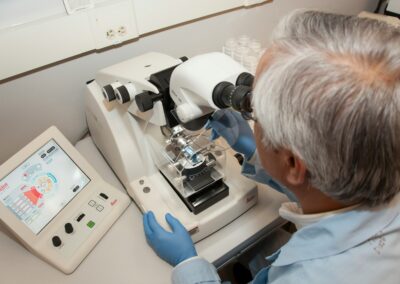How Advancements in Microbiome Research Are Revolutionizing Disease Treatment and Prevention
Advancements in microbiome research are paving the way for innovative approaches to treating and preventing diseases. The intricate ecosystem of microorganisms residing in our bodies, particularly in the gut, plays a crucial role in our overall health. In recent years, the exploration of the microbiome has led to groundbreaking discoveries, shedding light on how these microscopic communities influence various aspects of human physiology and disease. This research is not only transforming medical science but also holds significant potential for enhancing healthcare systems in regions such as Saudi Arabia and the UAE, known for their rapid adoption of cutting-edge technologies.
The profound impact of microbiome research on disease treatment is becoming increasingly evident. Researchers have identified specific microbial patterns associated with various conditions, including gastrointestinal disorders, autoimmune diseases, and even mental health issues. By understanding these patterns, scientists can develop targeted therapies that modify the microbiome to restore health. For instance, fecal microbiota transplantation (FMT) has shown remarkable success in treating Clostridium difficile infections by replenishing the gut with beneficial bacteria. This innovative approach could be further explored in Saudi Arabia and the UAE, where healthcare systems are continually evolving to incorporate the latest medical advancements.
Integrating Artificial Intelligence and Blockchain in Microbiome Research
Artificial Intelligence (AI) is revolutionizing microbiome research by enabling the analysis of vast amounts of data to uncover complex microbial interactions. AI algorithms can identify patterns and correlations that would be impossible to detect manually, accelerating the discovery of novel treatments and preventive measures. In Saudi Arabia and the UAE, where AI is a key focus area, integrating AI into microbiome research could enhance the precision and efficiency of healthcare interventions. By leveraging AI, researchers can develop predictive models that identify individuals at risk of certain diseases based on their microbiome profiles, leading to early interventions and improved health outcomes.
Blockchain technology offers a secure and transparent platform for managing and sharing microbiome data. Ensuring the privacy and security of sensitive health data is paramount, especially in regions with stringent data protection regulations like Saudi Arabia and the UAE. Blockchain can facilitate secure data exchange among researchers, healthcare providers, and patients, fostering collaboration and accelerating scientific discoveries. Moreover, blockchain’s immutable nature ensures the integrity of microbiome data, which is crucial for reproducibility and validation of research findings. Integrating blockchain with microbiome research could drive innovation and trust in this emerging field.
Executive Coaching and Leadership in the Era of Microbiome Research
As microbiome research advances, executive coaching services are essential to guide business leaders and healthcare executives in navigating this rapidly evolving field. Effective leadership is crucial in driving the adoption of microbiome-based innovations in healthcare systems. Executive coaching can provide leaders with the skills and knowledge needed to make informed decisions, foster collaboration, and champion the integration of microbiome research into clinical practice. In regions like Saudi Arabia and the UAE, where leadership development is a strategic priority, investing in executive coaching can ensure that healthcare leaders are well-equipped to leverage microbiome advancements for the benefit of their organizations and communities.
Change management is another critical aspect of integrating microbiome research into healthcare systems. The introduction of new technologies and approaches often requires significant organizational changes. Effective communication and stakeholder engagement are essential to overcome resistance and ensure a smooth transition. Change management strategies can help healthcare organizations in Riyadh and Dubai implement microbiome-based innovations effectively, maximizing their impact on patient care and public health. By fostering a culture of continuous improvement and innovation, healthcare leaders can drive the successful adoption of microbiome research in their institutions.
#MicrobiomeResearch #DiseasePrevention #InnovativeTreatment #AIinHealthcare #BlockchainSecurity #SaudiArabiaHealthcare #UAEHealthcare #ExecutiveCoaching #ChangeManagement #LeadershipSkills #HealthcareInnovation























